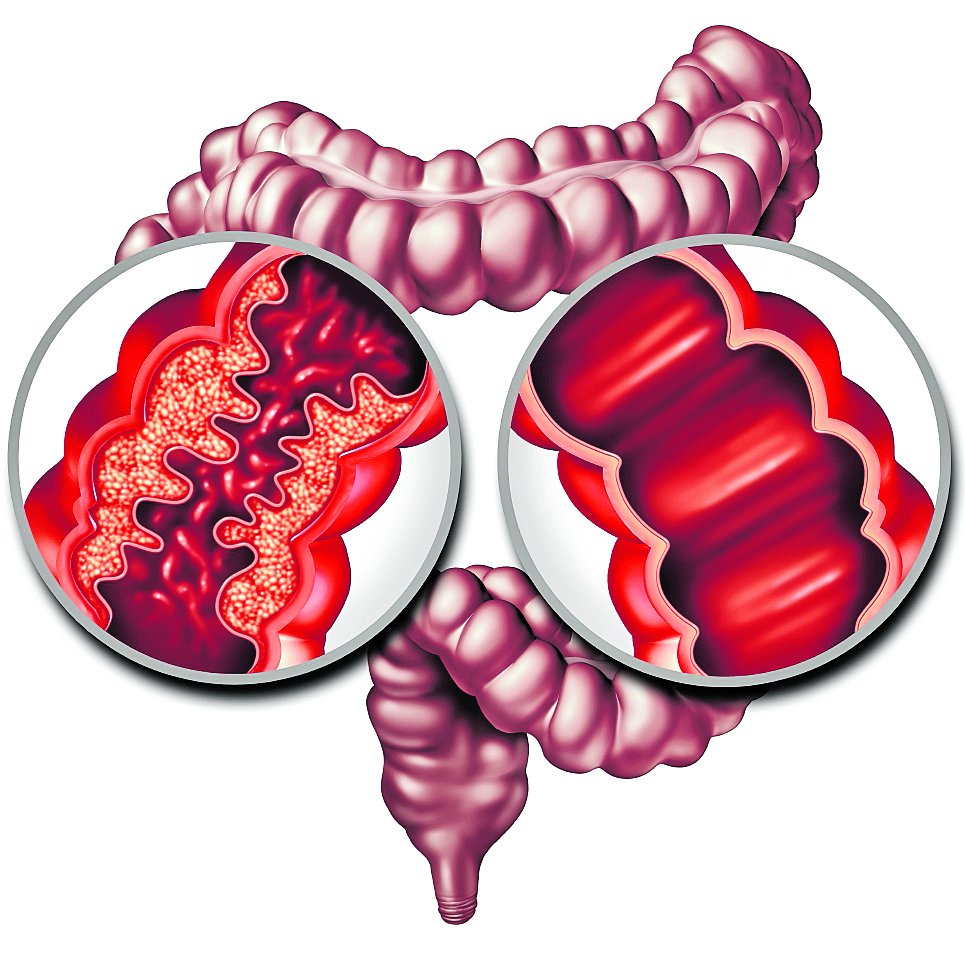Inflammatory bowel disease encompasses two pathologies: ulcerative colitis and Crohn’s disease, both of which affect the digestive tract.
Adopting healthy habits such as a balanced diet, exercising at least three times a week, and avoiding stress are important to prevent one of the diseases that affect the digestive tract, such as inflammatory bowel disease, considered a chronic pathology that can also affect psychologically.
Inflammatory bowel disease (IBD) is the term used to describe the different disorders that present chronic inflammation in the digestive tract: ulcerative colitis and Crohn’s disease.
According to Nadhykrishna Samayoa González, head of the Gastroenterology, Hepatology, and Gastrointestinal Endoscopy Unit at the IGSS Hospital of Diseases and CCMI Medical, this disease began in industrialized countries because citizens started bad habits such as eating too fast food, were sedentary and their stress levels increased. Later, these behaviors were adopted in Latin America, so the disease has increased and more and more patients are diagnosed with IBD.
What is IBD about?
“Inflammatory bowel disease is characterized by an alteration of the immune system. That is, white blood cells produce antibodies that neutralize the activity of bad bacteria, viruses, and fungi. But for some reason not yet defined, the immune system is altered and produces antibodies that, instead of attacking bacteria, viruses, and fungi, attack the body’s cells. Therefore, in these pathologies, in particular, the digestive system is destroyed,” explains Carlos Aliaga Dulanto, medical manager of Johnson & Johnson for Central America and the Caribbean.
Ulcerative colitis is a disease that presents inflammation and ulcers in the superficial lining of the large intestine (colon) and the rectum. Crohn’s disease is characterized by inflammation of the lining of the digestive tract.
Although they are two different diseases, that belong to the same group of pathologies, it does not mean that a person is diagnosed with both at the same time. In the case of Crohn’s disease, it is more common for it to appear between the ages of 15 and 35, but also from the age of 65; while ulcerative colitis is common between the ages of 15 and 35.
Both diseases generally present with diarrhea, blood in the stool, fatigue, abdominal pain, weight loss, and fever.
Ulcerative colitis
Ulcerative colitis is a chronic inflammatory disease of the large intestine, in which the lining of the colon becomes inflamed and develops small lesions or ulcers, which cause its main symptoms such as diarrhea, blood in the stool, and abdominal pain.
It can be classified as mild, moderate, or severe, according to the frequency of bowel movements, presence or absence of rectal bleeding, spasms, urgency to go to the bathroom, as well as painful contractions in the rectum.
“These factors have a direct impact on the lives of patients because they cause difficulties in finding work, absenteeism from work due to fatigue, medical appointments or hospitalization, fear of being in public places, as well as the need to be close to a bathroom and avoid traveling,” says Gastón Solano, senior medical manager of Pfizer Central America and the Caribbean.
Crohn’s disease
This is a chronic disease that causes inflammation in the digestive tract, which runs from the mouth to the anus. It generally affects the small intestine and the beginning of the large intestine. Its symptoms include abdominal pain, diarrhea, fever, weight loss, and rectal bleeding, among others, although these will depend on the area affected.

“The main characteristic of Crohn’s disease is that it affects the mucosa, submucosa, and the entire intestinal wall. It creates fistulas that can drain the abdomen. This pathology is more destructive than ulcerative colitis, although both have an aberrant disorder, which manifests itself in chronic inflammation,” says Samayoa González.
Risk factors
Anyone can suffer from this disease, especially if they do not eat a healthy diet, exercise, and live with too much stress. “There are several risk factors, but one of the most involved is the alteration of the microbiota, of the intestinal flora. This is destroyed by excessive consumption of alcohol, tobacco, fast food, and medications. Once the genetic factor is present, with these habits, the outbreak of the disease can occur,” says Aliaga Dulanto.
Having the “genetic factor” means that a person is prone to suffer from inflammatory bowel disease when someone in the family also has it. It does not always occur in all generations, meaning that if your father had it, you will also have it.
“It doesn’t occur in all generations, you can skip some, but you could have these chromosomes. That is to say, perhaps you have the dominant gene for the disease, but it is dormant and does not predominate, but if you have bad habits, you can wake it up and the disease can flare up,” explains the specialist.
For Samayoa González, inflammatory bowel disease can be prevented with habits such as exercising at least three times a week, relieving stress, and eating a healthy, natural diet. In addition to this pathology, other chronic diseases can also be prevented.
Preventive medicine
It is important to clarify that not every digestive disorder is synonymous with this disease. That is to say, if one day you have a swollen intestine, it means that you suffer from Inflammatory Bowel Disease. However, specialists call for avoiding the practice of going to the doctor when the ailments – of any disease – are already very strong.
The ideal thing is to go to the doctor when you have the first symptoms of any pathology, this way you will achieve an early diagnosis, which ensures better treatment.
“We are used to thinking that if we have diarrhea it is because of parasites or if I have abdominal pain it is because I have irritable bowel syndrome, so we self-medicate. Many patients with this disease have been undergoing treatments for diarrhea and abdominal pain for a long time, but none of them have cured them, they have only calmed them down and they come to the doctor when they no longer know what to do, and then the disease has already advanced,” explains Samayoa González.
Diagnosis and treatment
The test of choice for diagnosis is an endoscopy, in which a biopsy is performed and the sample is sent for a pathological study in which the characteristics of the intestinal tissue are determined and thus it is determined whether it is an Inflammatory Bowel Disease.
Clinical, immunological, and radiological criteria are then taken into account to determine and confirm the disease.
Today in Guatemala there are first-class treatments that help control the disease, however, there is still no cure. That is why prevention and early diagnosis are so important.
Healthy lifestyle
Once a person has been diagnosed, symptoms may decrease if they maintain a balanced diet and follow the recommendations of a specialist doctor. In the case of diet, there is no one-size-fits-all plan, because it must be carried out according to the symptoms and the affected part of the intestine.
Some tips that can be applied when you have a flare-up of the disease are:
- Avoid foods with preservatives and precooked foods.
- Limit your consumption of artificial sweeteners, as they can cause or increase the likelihood of diarrhea.
- Reduce your fat intake as it increases bowel movement and colic.
- Eat small, but regular meals. Small portions tend to be easier to digest.
- If you are lactose intolerant, avoid consuming lactose products, as this may cause diarrhea, nausea, and even abdominal pain.
- Limit high-fiber foods. If you don’t want to eliminate them from your diet, you can cook them before eating them.
- Avoid irritating foods such as coffee, chili, or spicy foods.
- Reduce simple sugars. These can increase the likelihood of developing or suffering from diarrhea.
- Avoid eating foods that cause gas such as cauliflower, broccoli, and carbonated drinks.
- Do not eat food that is too cold or too hot.






















+ There are no comments
Add yours